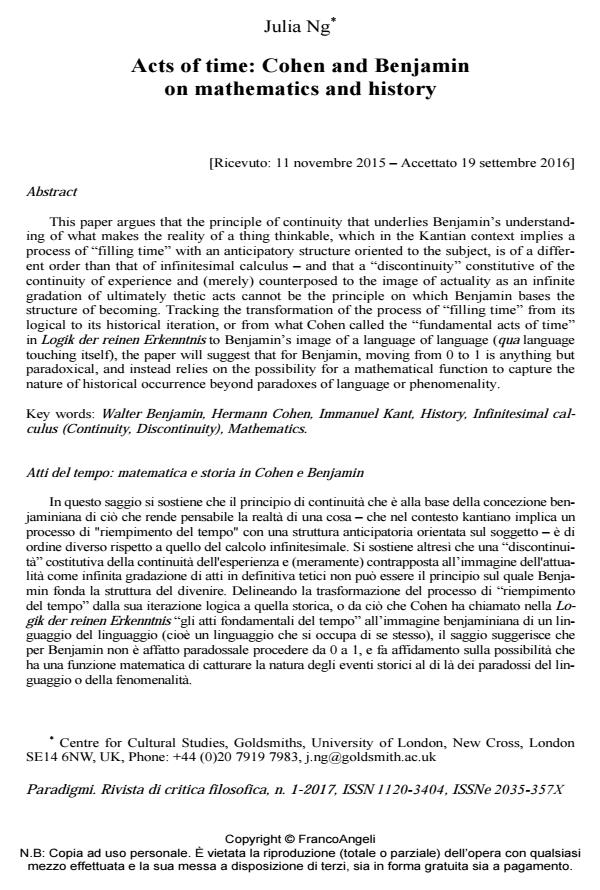Acts of time: Cohen and Benjamin on mathematics and history
Titolo Rivista PARADIGMI
Autori/Curatori Julia Ng
Anno di pubblicazione 2017 Fascicolo 2017/1 Lingua Inglese
Numero pagine 20 P. 41-60 Dimensione file 411 KB
DOI 10.3280/PARA2017-001004
Il DOI è il codice a barre della proprietà intellettuale: per saperne di più
clicca qui
Qui sotto puoi vedere in anteprima la prima pagina di questo articolo.
Se questo articolo ti interessa, lo puoi acquistare (e scaricare in formato pdf) seguendo le facili indicazioni per acquistare il download credit. Acquista Download Credits per scaricare questo Articolo in formato PDF

FrancoAngeli è membro della Publishers International Linking Association, Inc (PILA)associazione indipendente e non profit per facilitare (attraverso i servizi tecnologici implementati da CrossRef.org) l’accesso degli studiosi ai contenuti digitali nelle pubblicazioni professionali e scientifiche
This paper argues that the principle of continuity that underlies Benjamin’s understanding of what makes the reality of a thing thinkable, which in the Kantian context implies a process of "filling time" with an anticipatory structure oriented to the subject, is of a different order than that of infinitesimal calculus ? and that a "discontinuity" constitutive of the continuity of experience and (merely) counterposed to the image of actuality as an infinite gradation of ultimately thetic acts cannot be the principle on which Benjamin bases the structure of becoming. Tracking the transformation of the process of "filling time" from its logical to its historical iteration, or from what Cohen called the "fundamental acts of time" in Logik der reinen Erkenntnis to Benjamin’s image of a language of language (qua language touching itself), the paper will suggest that for Benjamin, moving from 0 to 1 is anything but paradoxical, and instead relies on the possibility for a mathematical function to capture the nature of historical occurrence beyond paradoxes of language or phenomenality.�
In questo saggio si sostiene che il principio di continuità che è alla base della concezione benjaminiana di ciò che rende pensabile la realtà di una cosa - che nel contesto kantiano implica un processo di "riempimento del tempo" con una struttura anticipatoria orientata sul soggetto - è di ordine diverso rispetto a quello del calcolo infinitesimale. Si sostiene altresì che una "discontinuità" costitutiva della continuità dell'esperienza e (meramente) contrapposta allʼimmagine dell'attualità come infinita gradazione di atti in definitiva tetici non può essere il principio sul quale Benjamin fonda la struttura del divenire. Delineando la trasformazione del processo di "riempimento del tempo" dalla sua iterazione logica a quella storica, o da ciò che Cohen ha chiamato nella Logik der reinen Erkenntnis "gli atti fondamentali del tempo" allʼimmagine benjaminiana di un linguaggio del linguaggio (cioè un linguaggio che si occupa di se stesso), il saggio suggerisce che per Benjamin non è affatto paradossale procedere da 0 a 1, e fa affidamento sulla possibilità che ha una funzione matematica di catturare la natura degli eventi storici al di là dei paradossi del linguaggio o della fenomenalità. .
Keywords:Walter Benjamin, Calcolo infinitesimale (Continuità, Discontinuità), Hermann Cohen, Immanuel Kant, Matematica, Storia
- Agamben G. (1999). Tradition of the Immemorial. In: Potentialities: Collected Essays in Philosophy. Stanford: Stanford University Press: 107-108 (Engl. transl. by D. Heller-Roazen).
- Benjamin W. I Ms (1850) and II Ms (1857) (untitled) at the Walter Benjamin Archiv, Akademie der Künste, Berlin.
- Benjamin W. (1974-1989). Gesammelte Schriften, hrsg. von R. Tiedemann und H. Schweppenhäuser, 7 vols, Frankfurt a. M.: Suhrkamp.
- Bolzano, B. (1851). Bernard Bolzano's Paradoxien des Unendlichen, hrsg. von Fr. Prihonsky, Leipzig: C.H. Reclam.
- Cohen H. (1883). Das Prinzip der Infinitesimal-Methode und seine Geschichte: Ein Kapitel zur Grundlegung der Erkenntnisskritik. Berlin: Dümmler.
- Cohen, H. (1885). Kants Theorie der Erfahrung. 2nd revised ed. Berlin: Dümmler.
- Cohen H. (1914 [1902]). Logik der reinen Erkenntnis. System der Philosophie. Erster Teil. 2nd corrected ed. Berlin: Bruno Cassirer.
- Derrida J. (1991). Interpretations at War: Kant, the Jew, the German. New Literary History, 22, 1: 39-95.
- Fenves, P. (2011). The Messianic Reduction: Walter Benjamin and the Shape of Time. Stanford: Stanford University Press.
- Gasché R. (2009). Europe, or the Infinite Task: a Study of a Philosophical Concept. Stanford: Stanford University Press.
- Hausdorff F. (1914). Grundzüge der Mengenlehre. Leipzig: Veit.
- Heidegger M. (1988). The Basic Problems of Phenomenology. Bloomington: Indiana University Press: 53-54 (transl. by A. Hofstadter).
- Leibniz G. W. (1989 [1702]). Letter to Varignon, with a Note on the “Justification of the Infinitesimal Calculus by that of Ordinary Algebra”, February 2, 1702. In: Philosophical Papers and Letters, ed. by L.E. Loemker, 2nd ed, Dordrecht-Boston: London: Kluwer Academic Publishers: 544.
- Mongré P. [= Hausdorff F.] (1897). Sant’Ilario: Gedanken aus der Landschaft Zarathustras. Leipzig: Naumann.
- Mongré P. [= Hausdorff F.] (1898). Das Chaos in kosmischer Auslese: Ein erkenntniskritischer Versuch. Leipzig: Naumann.
- Ng J. (2012). Kant’s Theory of Experience at the End of the War: Scholem and Benjamin read Cohen. MLN, 127, 3: 462-484.
- Ronell A. (2005). The Test Drive. Urbana and Chicago: University of Illinois Press.
- Schoenflies A. (1911). Über die Stellung der Definition in der Axiomatik. Jahresbericht der Deutschen Mathematiker-Vereinigung, 20: 222-255.
- Schoenflies A. (1921). Zur Axiomatik der Mengenlehre. Mathematische Annalen, 83: 173-200.
- Scholem G. (1995-2000). Tagebücher nebst Aufsätzen und Entwürfen bis 1923, 2 vols. Frankfurt a. M.: Jüdischer Verlag.
- Scholem G. (2012). Über Kant and gegen die metaphysische Erörterung des Raumes (On Kant. Against the Metaphysical Exposition of Space). MLN, 127, 3: 440-461.
- Varignon P. (1690). Nouvelles conjectures sur la pesanteur. Paris: Jean Boudot.
Julia Ng, Acts of time: Cohen and Benjamin on mathematics and history in "PARADIGMI" 1/2017, pp 41-60, DOI: 10.3280/PARA2017-001004